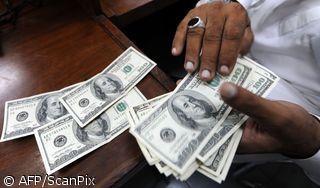It is the only source that can provide a chance for economic breakthrough
Published:
21 March 2005 y., Monday
Money from Russia’s Stabilisation Fund is expected to be invested abroad in dollar-nominated securities, with minimum investment risks and minimum profitability at 2-4%. These funds have until now been kept in Central Bank accounts. This means that a great deal of money will soon appear on the financial markets. On February 1, 2005, the Fund totaled 647.2 billion roubles ($23.1 billion), which mostly came from taxes on oil sales with prices exceeding $20 per barrel and export duties from oil companies.
The crucial question is how this money should be used. Money can only be taken out of the Fund when it has more than 500 billion roubles. Therefore, more than a fifth of its resources can already be used. This is a key issue for Russia’s economy, as the positive overseas market situation in recent years has been almost exclusively responsible for its growth.
However, experts are not tired of repeating that the potential of the resource-oriented Russian economy has been virtually exhausted. The mechanism whereby "we produce oil, sell it and enjoy the benefits" is becoming increasingly less effective. The country is now at a stage when it must introduce an industrial policy. However, any policy only makes sense when there is money to implement it.
Russia’s stock market and banking system do not provide the necessary financing for the real sector of the economy. Direct foreign investment in Russia remains at a very low level, while foreign investment in general is concentrated on either the import of equipment or foreign borrowings. The country obviously needs sources for further growth. The Stabilisation Fund is virtually the only potential source today and a genuine war is being waged for its funds.
Šaltinis:
financialexpress.com
Copying, publishing, announcing any information from the News.lt portal without written permission of News.lt editorial office is prohibited.
The most popular articles
 Nils Melngailis, the Chairman of Parex banka, and Alex M Furber, American Express Vice President in Central and Eastern Europe, agreed to explore further options for co-operation.
more »
Nils Melngailis, the Chairman of Parex banka, and Alex M Furber, American Express Vice President in Central and Eastern Europe, agreed to explore further options for co-operation.
more »
 Every one of the Taiwan's 23 million population has been given a voucher worth the equivalent of just over 100 U.S.dollars.
more »
Every one of the Taiwan's 23 million population has been given a voucher worth the equivalent of just over 100 U.S.dollars.
more »
 Commission cuts economic growth forecast as scale of financial crisis and ensuing global downturn become apparent.
more »
Commission cuts economic growth forecast as scale of financial crisis and ensuing global downturn become apparent.
more »
 Wincor Nixdorf AG completed the first quarter of the current fiscal year with 7 percent growth in net sales and an 8 percent increase in operating profit (EBITA).
more »
Wincor Nixdorf AG completed the first quarter of the current fiscal year with 7 percent growth in net sales and an 8 percent increase in operating profit (EBITA).
more »
 New homes go up in the UK's eastern county of Norfolk. There is also the unusual take on selling new homes.
more »
New homes go up in the UK's eastern county of Norfolk. There is also the unusual take on selling new homes.
more »
 Announces approximately 4,000 additional workforce reductions, primarily in the Mobile Devices business. Total cost savings from recent actions now expected to be approximately $1.5 billion in 2009.
more »
Announces approximately 4,000 additional workforce reductions, primarily in the Mobile Devices business. Total cost savings from recent actions now expected to be approximately $1.5 billion in 2009.
more »
 MasterCard announces organizational changes.
more »
MasterCard announces organizational changes.
more »
 Economic volatility , rising prices and a general pessimism about what the future holds were all opinions voiced in a recent “Eurobarometer” European survey.
more »
Economic volatility , rising prices and a general pessimism about what the future holds were all opinions voiced in a recent “Eurobarometer” European survey.
more »
 Wincor Nixdorf AG says it exceeded its profit goals for fiscal year 2007/2008, which ended Sept. 30, despite a battered global economy and a slight drop in retail sales.
more »
Wincor Nixdorf AG says it exceeded its profit goals for fiscal year 2007/2008, which ended Sept. 30, despite a battered global economy and a slight drop in retail sales.
more »
 Across the country Australians are expected to spend over 10 billion U.S. dollars in post-Christmas sales.
more »
Across the country Australians are expected to spend over 10 billion U.S. dollars in post-Christmas sales.
more »